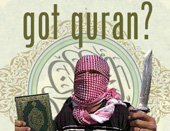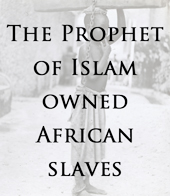Islam is Tolerant
of Other Religions
The Myth:
Religious
minorities have flourished under Islam. Muslims are ordered to protect
Jews and Christians (the People of the Book) and do no harm to them. In Sura 109, the Quran
says, "To you, your religion. To me, mine."
The Truth:
Religious
minorities have not “flourished” under Islam. In fact, they always dwindle
to mere shadows after a few centuries of persecution and discrimination. Some
were converted from their native religion by brute force, others under the
agonizing strain of dhimmitude.
What
Muslims call “tolerance,” others correctly identify as institutionalized
discrimination. The consignment of Jews and Christians to dhimmis under
Islamic rule means that they are not allowed the same religious rights and
freedoms as Muslims. They cannot share their faith, for example, or build
houses of worship without permission. (See
this
link for rules imposed by the Islamic State)
Historically, dhimmis have often had to wear distinguishing clothing or cut
their hair in a particular manner that indicates their position of inferiority
and humiliation. They do not share the same legal rights as Muslims, and
must even pay a special tax (the jizya). They are to be killed or have
their children taken from them if they cannot satisfy the tax collector’s
requirements.
For
hundreds of years, the Christian population in occupied Europe had their sons
taken away and forcibly converted into Muslim warriors (known as Jannisaries) by
the Ottoman Turks.
It is
under this burden of discrimination and third-class status that so many
religious minorities converted to Islam over the centuries. Those who refused faced
economic and social hardships that persist to this day and are appalling by
the Western standards of true religious tolerance and pluralism.
For those
who are not “the People of the Book,” such as Hindus and atheists, there is very
little tolerance to be found once Islam establishes political superiority.
The Quran tells Muslims to “fight in the way of Allah” until “religion is only
for Allah.” Conquered populations face death if they do not establish
regular prayer and charity in the Islamic tradition (ie. the pillars of Islam).
According to Ibn Kathir, verse 58:22 of the Quran, warning Muslims against trusting non-believing family members and friends, was given in response to an episode in which a man killed his own father for promoting idols. This would have been narrated by Muhammad at the time:
The father of Abu ` Ubaydah bin Al-Jarrah was
repeatedly praising the idols to his son on the day of Badr, and Abu ` Ubaydah kept avoiding
him. When Al-Jarrah persisted, his son Abu ` Ubaydah headed towards him and killed him. Allah
revealed this Ayah in his case. (Tasfir Ibn Kathir)
Tamerlane
and other Muslim warriors slaughtered tens of millions of Hindus and
Buddhists, and displaced or forcibly converted millions more over the
last thousand years. Islamists in Somalia
behead Christians. In Iran, they are
jailed.
One of the
great ironies of Islam is that non-Muslims are to be treated according to the
very standards by which Muslims themselves would claim the right to violent self-defense if the the shoe were on the other foot. Islam is its own justification.
Most Muslims therefore feel no shame about the ingrained arrogance and
double standard.
As an example, in 2020, Turkey decided to turn the Hagia Sophia into a mosque.
The church is one of the most historic in the world, having been the center of the
Eastern Orthodox empire before its violent seizure by Muslims in 1453. With
Christian symbols throughout, it is no different from overrunning the Vatican
and declaring St. Peter's Cathedral a mosque.
There are about 500
verses in the Quran that speak of Allah’s hatred for non-Muslims and the
punishment that he has prepared for their unbelief. There is also a tiny
handful that could be construed to say otherwise, but these are mostly earlier verses that many
scholars consider to be abrogated by the later, more violent ones.
As for Sura 109 ("to you, your religion; to me, mine"), any true Quran
scholar will point out that the purpose of the verse was to distinguish Islam
from the gods of the Quraysh (one of which was named "Allah") rather than to
advocate religious tolerance for non-Muslims.
At the time that he narrated
this very early verse, Muhammad did not have any power, and thus no choice but
to be "tolerant" of others. By contrast, there was little tolerance shown
when he returned to Mecca with power many years later and demanded the
eviction or death of anyone who would not
convert to Islam. In fact, he physically destroyed the cherished idols of the very people
he addressed in Sura 109 - and, like the Hagia Sophia, claimed their house of worship as his own (the Kaaba at Mecca).
If tolerance simply means
discouraging the mass slaughter of those of a different faith, then today's
practice of Islam generally meets this standard more often than not. But, if tolerance
means allowing people of other faiths the same religious liberties that Muslims
demand, then Islam is fundamentally the most intolerant religion under the sun.
[Note: In 2023, professor Johnathan Brown of Georgetown, a prominent convert to Islam, candidly admitted discrimination against religious minorities but defended it by saying that if non-Muslims want equal rights, then they can always convert]
|





